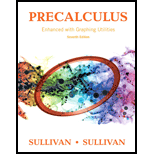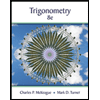
Concept explainers
Hours of Daylight According to the Old Farmer's Almanac, in Detroit, Michigan, the number of hours of sunlight on the summer solstice of 2015 was , and the number of hours of sunlight on the winter solstice was .
(a) Find a sinusoidal function of the form that models the data.
(b) Use the function found in part to predict the number of hours of sunlight on April 1, the 91st day of the year.
(c) Draw a graph of the function found in part .
(d) Look up the number of hours of sunlight for April 1 in the Old Farmer’s Almanac, and compare the actual hours of daylight to the results found in part .
Want to see the full answer?
Check out a sample textbook solution
Chapter 6 Solutions
Precalculus Enhanced with Graphing Utilities (7th Edition)
Additional Math Textbook Solutions
Calculus for Business, Economics, Life Sciences, and Social Sciences (14th Edition)
Precalculus
Introductory Statistics
Elementary Statistics: Picturing the World (7th Edition)
Algebra and Trigonometry (6th Edition)
University Calculus: Early Transcendentals (4th Edition)
- Pls help me with accurate answer asap plsarrow_forwardPls help me asap pls plsarrow_forwardExercise 1 Given are the following planes: plane 1: 3x4y+z = 1 0 plane 2: (s, t) = ( 2 ) + ( -2 5 s+ 0 ( 3 t 2 -2 a) Find for both planes the Hessian normal form and for plane 1 in addition the parameter form. b) Use the cross product of the two normal vectors to show that the planes intersect in a line. c) Calculate the intersection line. d) Calculate the intersection angle of the planes. Make a sketch to indicate which angle you are calculating.arrow_forward
- Only 100% sure experts solve it correct complete solutions okarrow_forwardrmine the immediate settlement for points A and B shown in figure below knowing that Aq,-200kN/m², E-20000kN/m², u=0.5, Depth of foundation (DF-0), thickness of layer below footing (H)=20m. 4m B 2m 2m A 2m + 2m 4marrow_forwardsy = f(x) + + + + + + + + + X 3 4 5 7 8 9 The function of shown in the figure is continuous on the closed interval [0, 9] and differentiable on the open interval (0, 9). Which of the following points satisfies conclusions of both the Intermediate Value Theorem and the Mean Value Theorem for f on the closed interval [0, 9] ? (A A B B C Darrow_forward
- = Q6 What will be the allowable bearing capacity of sand having p = 37° and ydry 19 kN/m³ for (i) 1.5 m strip foundation (ii) 1.5 m x 1.5 m square footing and (iii)1.5m x 2m rectangular footing. The footings are placed at a depth of 1.5 m below ground level. Assume F, = 2.5. Use Terzaghi's equations. 0 Ne Na Ny 35 57.8 41.4 42.4 40 95.7 81.3 100.4arrow_forwardQ1 The SPT records versus depth are given in table below. Find qan for the raft 12% foundation with BxB-10x10m and depth of raft D-2m, the allowable settlement is 50mm. Elevation, m 0.5 2 2 6.5 9.5 13 18 25 No.of blows, N 11 15 29 32 30 44 0 estigate shear 12%arrow_forwardQ2 A/ State the main field tests which may be carried out to investigate shear strength of a soil layer? B/ What are the main factors that affecting the spacing and number of boreholes for a given project? C/ Illustrate the causes of disturbance of Shelby tubes samples.arrow_forward
- Algebra & Trigonometry with Analytic GeometryAlgebraISBN:9781133382119Author:SwokowskiPublisher:Cengage
 Trigonometry (MindTap Course List)TrigonometryISBN:9781305652224Author:Charles P. McKeague, Mark D. TurnerPublisher:Cengage Learning
Trigonometry (MindTap Course List)TrigonometryISBN:9781305652224Author:Charles P. McKeague, Mark D. TurnerPublisher:Cengage Learning Trigonometry (MindTap Course List)TrigonometryISBN:9781337278461Author:Ron LarsonPublisher:Cengage Learning
Trigonometry (MindTap Course List)TrigonometryISBN:9781337278461Author:Ron LarsonPublisher:Cengage Learning


